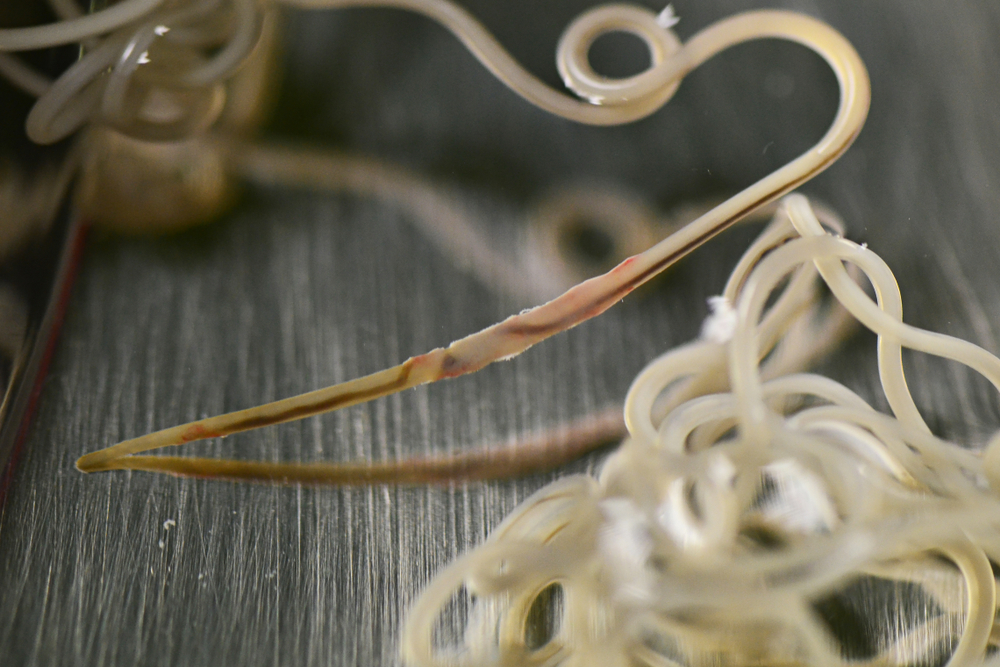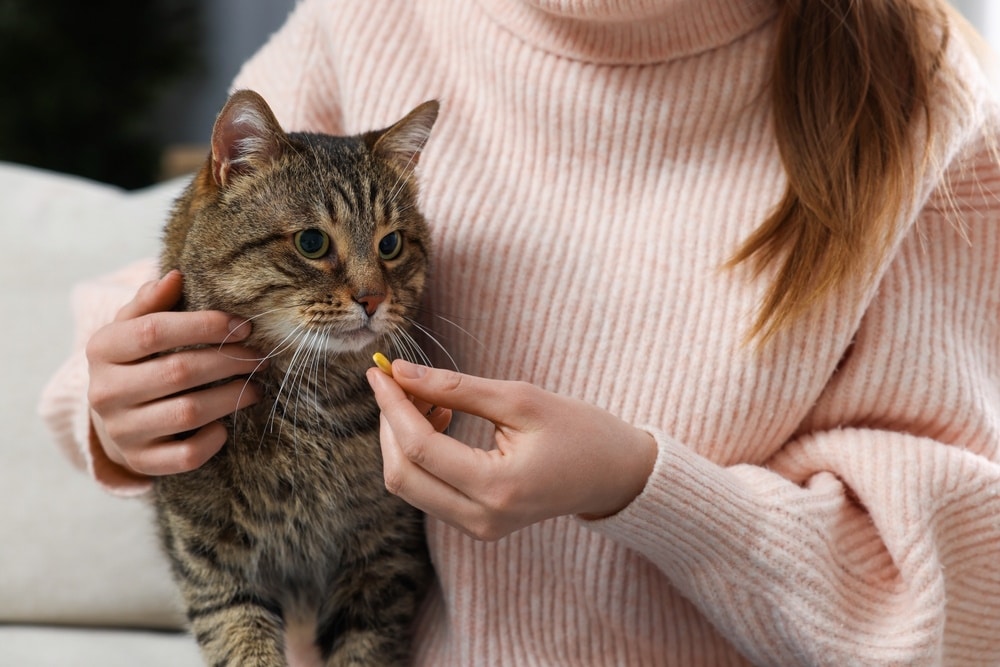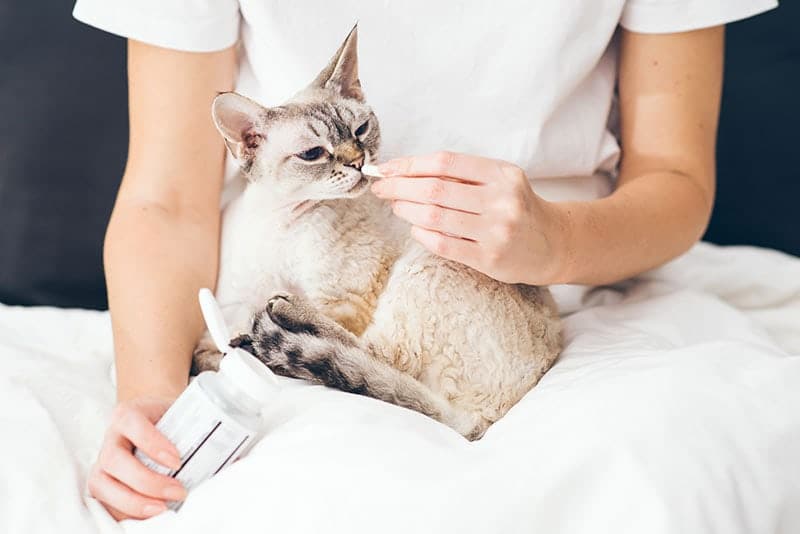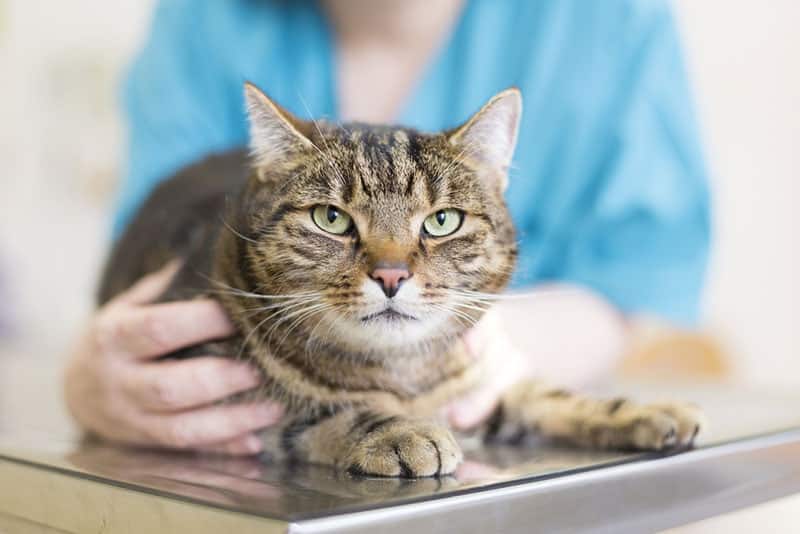Heartworm disease is found in every state in the U.S., and while it can be serious, it’s also preventable through monthly or once-a-year medications.1
For monthly medications, a common issue is the often inevitable “missed dose.” If giving your cat their monthly heartworm medication slips your mind, they may be at risk for developing heartworm disease. Give them the next dose right away, and contact your veterinarian. There may be further testing that your cat will need to undergo, depending on how late the dose is.

What Is Heartworm?
Heartworm disease in cats is caused by a worm called Dirofilaria immitis. These little worms live in the heart, the lungs, and the blood vessels associated with these structures. When the worms get large enough, they can cause significant damage, potentially leading to lifelong complications or even death.
Heartworm larvae are transmitted from cat to cat by hitching a ride with mosquitos that feed on a cat’s blood. The mosquitos ingest the larva, and within a few weeks, they can move to another cat, where they live in the bloodstream until they morph into immature adults (within about 2 months) and then into mature adults in about 6–7 months. These mature adults can reproduce and will cause most of the damage.

What Are Heartworm Preventatives?
In the same way that you get your cat vaccinated to help prevent certain diseases, you can give them heartworm preventatives to prevent infections. These medications work by killing the heartworms that are in the larval stage. They aren’t as effective once the larvae develop into immature adults.
Most heartworm medications are given monthly, either as an oral tablet or a topical liquid. For example, Heartgard is a once-monthly flavored tablet that is prescribed by a veterinarian but can be given at home.
Along with getting heartworm medications, you’ll need to have your cat tested for heartworm at least once a year. This is to ensure that the heartworm preventative is working properly and that your cat doesn’t have an infection. Be aware that these tests can only detect adult heartworms, not the larvae, so it can take 6–7 months or more to achieve a positive test result, even if your cat has had a heartworm infection the whole time.
Why Do Some Heartworm Medications Need to Be Given Monthly?
The recommended dose of most heartworm medications is once a month, but why is that? This dosage is due to the assumption that your cat is constantly being exposed to heartworm larvae through the bites of infected mosquitos. Giving them medication once a month helps ensure that those larvae are killed before they get a chance to develop into adults and cause serious problems.

What Happens If You Miss a Month of Heartworm Medication?
Months can easily vanish in the blink of an eye, so remembering monthly heartworm medication can sometimes be a problem. If you happen to forget your cat’s heartworm medication dose, you’re not alone! It’s not uncommon at all, but missing a dose of heartworm medication does require immediate action because it gives heartworm larvae a chance to develop into adults that won’t likely be killed by the medication and can start to reproduce and cause damage.
You don’t want to leave your cat exposed to heartworm, so give them the next dose immediately, and then contact your veterinarian. Depending on how late you are in the schedule, your cat may require further testing. Let’s look at a few explanations, using Heartgard as an example.
If you are 2 weeks late on Heartgard dosing for your cat, they will likely be fine. It takes the larvae 50–60 days to develop into immature adults that are more resistant to these medications. Just give them the medication when you remember it, and then contact your veterinarian. They may recommend testing your kitty for heartworm in 6–7 months just to be sure they’re in the clear, and they will have you resume your normal dosing schedule the next month. If you are 3 weeks late on Heartgard, follow the same protocols.
Every week that you’re late with your cat’s monthly dose increases the chances that those larvae will develop into adults that won’t be killed by the medication. So, if you miss a month of Heartgard, give the next dose as soon as possible, and contact your vet for further instructions. Testing will likely be recommended in 6–7 months, and you’ll want to resume your normal schedule the next month.
Do You Have to Give Heartworm Medications All Year?
Many places in the southern United States and other parts of the world have mosquitos all year, which means heartworm can be transmitted during winter in these places. Even northern areas, where mosquitoes die off due to the cold weather, aren’t completely safe.
While it was once recommended to pet owners in northern areas that they only needed to give heartworm preventatives to their pets in the summer months, it’s now highly recommended that they be given year-round. The reason is that it’s not always clear when mosquito season will start, and you want to make sure your kitty is protected should it come early. Also, certain wet areas may still harbor mosquito activity even in cooler temperatures. If you live in an area where heartworm is rare, year-round prevention is still recommended. Speak to your vet if you have any questions.


Conclusion
Heartworm disease is a potentially dangerous issue that is, fortunately, quite preventable. It does require regular, often monthly, administration of heartworm preventatives that can sometimes be hard to remember to give. If you happen to miss a month of heartworm medication, give the dose as soon as you can, and speak to your veterinarian to determine what further steps need to be taken.
Featured Image Credit: brodtcast, Shutterstock










